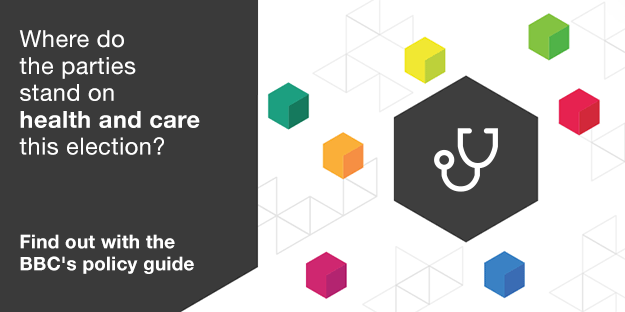NHS funding: Public 'back tax rises for healthcare'
- Published
- comments

A majority of people in Britain support tax rises as a way of funding the NHS, a poll suggests.
The Ipsos MORI survey of nearly 1,800 people for the Health Foundation think tank found 85% thought the NHS should be protected from cuts - significantly more than other public services.
When presented with a range of options setting out how that could be achieved, 59% said they supported tax rises.
There was also some support for fining people for missing appointments.
But only 16% were in favour of charging for services, such as a £10 fee for GP appointments.
Funding of the NHS is already proving to be a major theme of the election campaign. The Conservatives, Labour, Liberal Democrats, UKIP and Greens have all promised extra funds for the health service.

Richard Taunt, the Health Foundation's director of policy, said: "It's clear the public think the government should continue to support the principles of our NHS and want to see it protected from spending cuts."
But he said that would "inevitably involve some difficult decisions".
This was reflected by the fact that, while 85% said the NHS should be tax-funded, free at the point of use and providing comprehensive care, only 63% thought it would continue to be free by 2020.

Poll funding findings in detail
85% said the NHS should be protected, compared with 45% who said the same for elderly care and 49% for schools.
Only 12% said council, 13% benefits and 5% overseas aid budgets should be protected.
To ensure funding kept pace with the growing pressures on services, 59% said tax rises should be used, while 21% said cuts to other budgets. Only 7% said NHS care should be scaled back.
When asked about charges to help fund the NHS, 61% said they would support £10 fines for missed appointments, but only 16% were in favour of a £10 fee to see a GP.
85% said the government should support an NHS that is tax-funded, free at the point of use and providing comprehensive care to all citizens.

Nearly one in three thought care had got worse in the past six months, but 51% said it had not really changed and 11% thought it had got better.
Opinion was divided over the use of the private sector, with 30% saying private sector involvement would make the health service better, 33% worse and 34% stay the same.
Katherine Murphy, chief executive of the Patients Association, said: "The underlying message is that the public want the NHS to continue to be protected by government, remain tax-funded and free for everyone - and with this the Patients Association agrees."
Separately, Dr Mark Porter, head of the British Medical Association, t told the Guardian, external whichever new government is formed after the general election will face a temptation to introduce charges and may not be deterred by the unpopularity of such a move.
"I think they will be tempted. They said in 1950 that a Labour government wouldn't introduce charging and it did," he said.
Dr Porter also said any future government "must resist" moves to introduce charges.
- Published26 March 2015

- Published13 March 2015
- Published19 March 2015